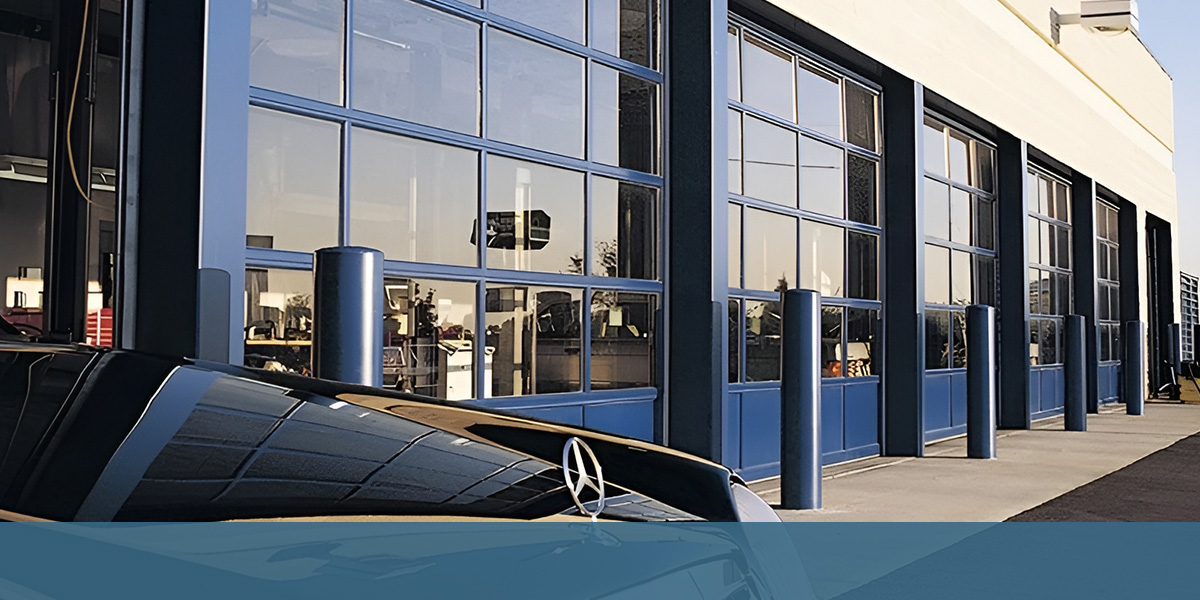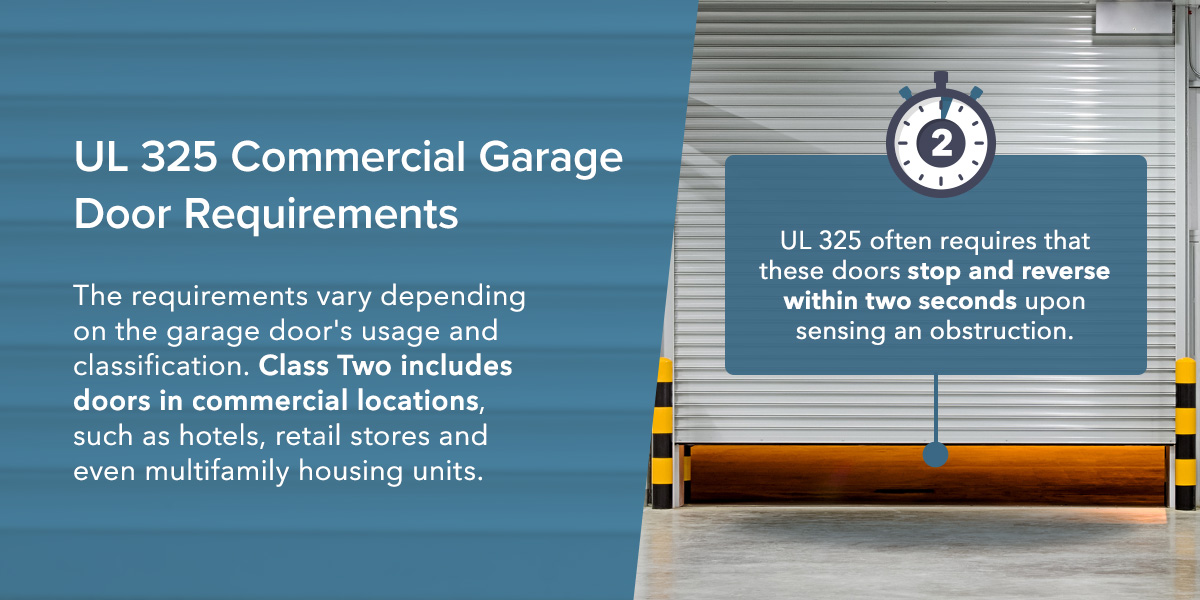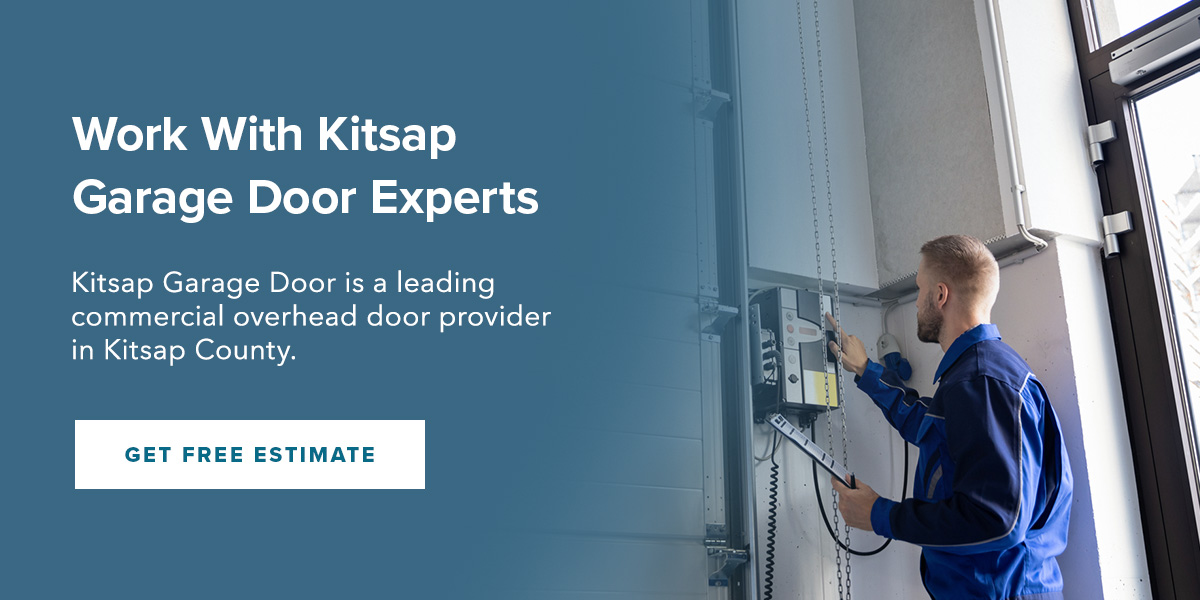
Commercial Garage Door Safety Requirements
As a business owner, you’re responsible for the safety of your customers and employees. When it comes to commercial garage doors, overlooking safety can lead to serious accidents, legal issues and disrupted operations.
This guide breaks down the essential safety requirements for commercial garage doors, helping you protect your business and ensure a safer environment. Learn about potential hazards, key safety standards like UL 325 and NFPA 80, and actionable steps you can take today.
Potential Dangers With Commercial Garage Doors
Commercial garage doors are heavy, and the components are under significant pressure. Proper installation, care and maintenance are essential to keep them working safely and effectively.
Dangers of a malfunctioning garage door include:
- Physical injuries and death: Problems like a misaligned track, damaged torsion springs or defective cables can lead to physical injuries to your customers or employees.
- Fire hazards: In some commercial settings, garage doors are designated fire exits. To meet safety standards, these doors must be rated to help contain the fire and maintain the emergency exit route.
- Legal implications: A subpar commercial garage door can have legal implications for your business if it harms your customers and employees. Adopting safety measures can save you huge costs in times of accidents.
- Disrupted operations: If your commercial garage doors are not well-maintained, small issues like loose nuts and bolts can lead to bigger problems that disrupt your daily routine. Planned regular maintenance is better than an unexpected pause in operations.
The Importance of Adapting to Safety Requirements
Commercial overhead doors have safety requirements to protect everyone on your property, whether a customer, guest or employee. The Occupational Safety and Health Administration (OSHA) does not specify standards directly for overhead doors. However, the OSH Act of 1970 states that employers shall provide a place of employment free from hazards that can cause serious physical harm or death to their employees, making commercial garage door safety a necessity.
Adapting to safety standards is also an ethical practice that shows you truly care about protecting employees and guests.
What Are the Commercial Garage Door Safety Requirements?
Underwriters Laboratories (UL) and the National Fire Protection Association (NFPA) are the main organizations you can refer to for commercial garage door safety requirements.
UL 325 Commercial Garage Door Requirements

UL is a globally known organization that aims to improve safety, security and sustainability issues across 110 countries. It works with the Consumer Product Safety Commission (CPSC) to provide safety standards that reduce the risks of entrapment accidents. One standard is UL 325, which applies to doors, draperies, gates, louvers, window operators and systems.
The requirements vary depending on the garage door’s usage and classification. Class Two includes doors in commercial locations, such as hotels, retail stores and even multifamily housing units. UL 325 often requires that these doors stop and reverse within two seconds upon sensing an obstruction.
To comply with UL 325, commercial doors often incorporate the following safety features:
- Inherent entrapment protection systems: This type of system allows the garage door to stop and reverse upon sensing an obstruction — typically within two seconds.
- Inherent adjustable clutch: This feature automatically stops the gate once it senses an obstruction. The closing force is limited.
- Contact sensors: These edge devices or similar sensors allow the gate to stop and reverse, usually within two seconds, upon contact with an obstruction.
- Noncontact photoelectric sensors: The photoelectric sensor stops and reverses the gate, generally within two seconds, when an obstruction is detected in the pathway.
- Actuating devices: These require continuous pressure to open and close the gate. Once the pressure is removed, the gate must stop moving.
Fire Code Requirements
Commercial garage doors used as emergency exits during a fire need to be fire-rated to prevent flames from spreading rapidly. These doors must be made with fire-resistant materials that can withstand intense heat and high temperatures.
Your fire-rated commercial door can be made of:
- Steel: Steel fire doors are very common, especially in commercial buildings.
- Timber: Solid-core timber doors can achieve fire ratings with an attractive look that boosts curb appeal.
- Composite materials: These doors use a combination of materials for enhanced fire resistance.
NFPA 80 is the standard to use, which includes codes and recommended practices approved by the American National Standards Institute (ANSI). The requirements state that fire doors should be tested and inspected annually.
How to Keep Your Commercial Garage Door Safe to Use
Now that you know the requirements and potential hazards of commercial garage doors, here are actionable steps to maintain safety in your business environment:
- Ensure proper installation: When installing commercial garage doors, code authorities should be involved to ensure the system’s safety. They can verify that the class is appropriate. A qualified technician should also be the one to perform the installation.
- Perform regular maintenance: Garage doors involve a lot of moving parts. Routine inspections ensure they all work well, helping you avoid future accidents. It’s best to work with a professional who knows what to look for, including defective cables, damaged torsion springs, loose bolts and other concerns.
- Use two entrapment protection systems: Using two entrapment protection devices will increase safety. Primary protection might come from an actuating device, while secondary entrapment protection could be a noncontact photoelectric sensor. Photoelectric sensors will monitor the pathway and stop the door from closing if there’s an obstruction. Refer to the UL 325 standards for these systems.
- Consider safety guards: Safety guards cover the moving parts of your garage door, which can help prevent accidents.
- Adopt emergency release mechanisms: An emergency release mechanism enables you to manually operate the garage door in case of malfunction or power failure. It allows for an easier evacuation process during emergencies.
- Train your employees: Training your employees on the hazards and proper management of your garage doors is essential. They will be using the doors from day to day and will likely be the ones present during emergencies. That said, maintaining your garage doors is still best left to experts.
Work With Kitsap Garage Door Experts for Your Commercial Garage Doors
Kitsap Garage Door is a leading commercial overhead door provider in Kitsap County. With over 40 years of experience, we know the industry and the safety standards your door needs to meet.
Whether you need a garage door for a fire station, a car dealership, a restaurant or another commercial space, we have a wide selection for you to choose from. We can also personalize doors depending on your taste, needs and budget. Whatever your preference, you’ll get a safe, reliable and sturdy garage door that can offer your business peace of mind. Contact us today and get a free estimate!


